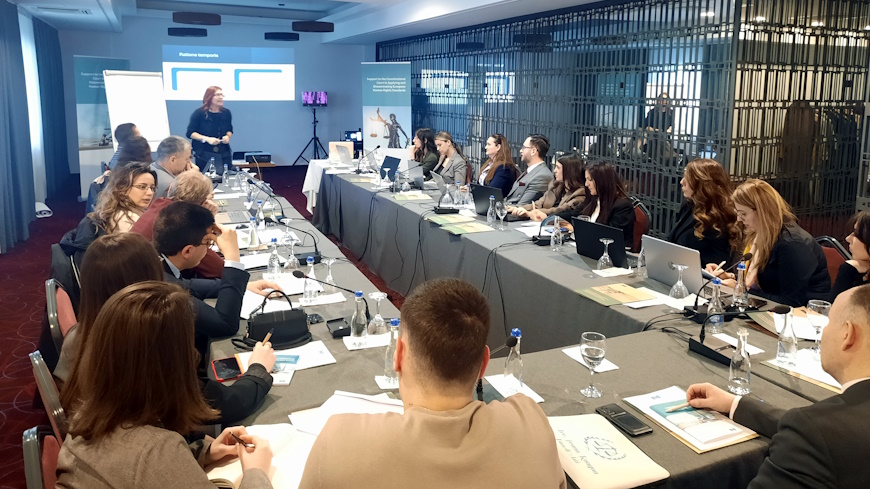Reasonable time of proceedings is one of the most important procedural guarantees of the right to fair trail enshrined in the Article 6.1 of the European Convention of Human Rights (ECHR). Based on the well-established caselaw in this field, the European Court of Human Rights (ECtHR) considers that the excessive length of proceedings indicates poor functioning of the judiciary.
In its own practice so far, the Constitutional Court of Kosovo* has also decided on several cases involving alleged violations of the right to trial with a reasonable time. Based on some substantive issues and dilemmas deriving from the caselaw, it requested from Council of Europe further expertise to ensure its practices align with ECtHR standards.
In view of this request, our project organised workshop on the right to trial within a reasonable time, facilitated with support of international consultant Ivana Roagna, one of the most prominent experts in this area, author of the Council of Europe’s handbook on this topic. 20 legal advisors of the Constitutional Court engaged in interactive discussions on different aspects of application of the reasonable-time-of-proceedings’ standard through analyses of the landmark cases of the ECtHR and references to domestic caselaw. They also analysed relevance of this standard in domestic legislation and discussed key problem areas in Kosovo* judiciary.
Very productive discussions developed around the scope of application of the Article 6 requirement, including ratione temporis, and other relevant topics such as autonomous notions of civil rights and obligations and criminal charge, and the notion of victim, with particular attention to the cases requiring special and exceptional diligence. Participants explored the effects of unduly long proceedings on the enjoyment of other rights through interplay with the Article 3 ECHR, Prohibition of Torture, Article 5, Right to Liberty and Security, Article 8, Right to Private and Family Life, Article 13, Right to Effective Remedy, Article 14, Prohibition of Discrimination, and Article 1, Protocol 1, Right to Property. Considerable time was also allocated for discussion on the available remedies at domestic level and their compatibility with ECHR requirements.
The workshop utilized a mix of presentations, interactive discussions, case studies, and Q&A sessions, providing a comprehensive collaborative learning experience. Participants were involved in practical exercises on standard criteria in calculating the length proceedings, taking in consideration total duration of trial against the complexity of the case, conduct of parties in proceedings, and judicial inactivity periods.
This workshop was the fifth in a series designed for Constitutional Court’s legal practitioners, with topics selected based on the court's specific needs. By the end of the project, at least two additional thematic workshops on ECHR/ECtHR standards will be organised for legal professionals of the main project beneficiary, along with study visit to the Austrian Constitutional Court and further support to the Jurisconsult.
[1] All references to Kosovo, whether to the territory, institutions, or population, in this text shall be understood in full compliance with United Nations Security Council Resolution 1244 and without prejudice to the status of Kosovo.




